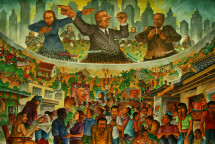Ideas into movement
Boost TNI's work
50 years. Hundreds of social struggles. Countless ideas turned into movement.
Support us as we celebrate our 50th anniversary in 2024.

How can peasant territories foster emancipation?

With many neo-liberal governments across the world taking up elements of authoritarianism and right-wing populism, peasants are facing new threats. In Brazil, right-wing populism, in combination w ith neoliberal ideologies, leads to austerity measures that dismantle pro-poor and pro-minority policies, and to policies that support and promote the insertion of agriculture and food production into global markets. These measures contribute to the economic marginalisation and social exclusion of groups such as peasants and indigenous people. Scoones et. al argue that emancipatory alternatives, alternatives that allow people to be different and to do things differently, are necessary to counter, and protect peasants from, processes of social exclusion and economic marginalisation.
Brazilian peasant movements have historically created emancipatory alternatives by constructing peasant territories: geographical and socio-material spaces that are shaped in accordance to peasants’ own values. In the Zona da Mata region in Minas Gerais, peasants have risen from their territories to protest against austerity measures and the government that has implemented them. Their territories have offered resistance against global markets from affecting and controlling their ways of farming and ways of life, both now and in the past. The new Brazilian federal government that was established after the impeachment of Dilma Roussef in 2015 has triggered a new wave of resistance and has reaffirmed peasants’ desire to do things differently and to construct alternative farming, education, innovation, market and other practices that strengthen their territories and foster their own emancipation. Few studies explore how peasant territories can foster emancipation.
First, most of the literature in peasant and social movement studies see large (trans)national peasant or food movements, rather than peasant territories, as the primary agents for peasant emancipation. Second, peasant territories are often described as a product of continual conflict, as “territories of resistance” that are shaped in reaction to “territories of domination”. Such a view does not adequately explain how other, non-reactionary wishes shape territorial resistance and foster emancipation. Third, little is known about how peasant territories respond to wider socio-political environment changes, particularly when neo-liberal governments become more authoritarian and take up elements from right-wing populist movements, and how these responses affect peasant emancipation. This article seeks to contribute to a better understanding of peasant territories as an emancipatory alternative by looking at how two peasant territories in Brazil have engendered and engender the wish for difference and different forms of resistance. In the next section we el aborate on the concepts of territories and the link between resistance, existence and emancipation. We then discuss the context of agrarian development in Brazil and the region of Zona da Mata, after which we offer a detailed account of the case of two pea sant territories in the Zona da Mata. The article concludes by discussing how peasant territories in Brazil are a major vehicle for resistance and peasant emancipation.
This paper was presented at the Emancipatory Rural Politics Initiative (ERPI) 2018 Conference: "Authoritarian Populism and the Rural World"